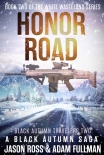Honor Road - Jason Ross (phonics story books .TXT) 📗

- Author: Jason Ross
Book online «Honor Road - Jason Ross (phonics story books .TXT) 📗». Author Jason Ross
It was with palpable relief that he finally reached the high saddle of the Blue Mountains. He crossed the open meadow in the moonlit dark. The half-moon hadn’t set until three a.m. that night, and he’d come to see that moonlight was almost as good as daylight for overland travel, and it was undeniably safer.
Other than five nights on each side of the new moon, he enjoyed a few hours of workable moonlight. Each month, fully half of all nighttime hours were bright and navigable, particularly across snow. There wasn’t enough natural light for fine tasks, like tying snare wire, but if he shadowed the rising moon, he no longer required a flashlight. He could travel, set up camp, sort his pack and prepare meals without artificial light. Stuck within the walls of the canyon, amidst shiftless strangers, his nocturnal habits armed him with the double-edged sword of secrecy and solitude. But his emotions despised his isolation. His mind buckled and bent. He awoke once, weeping, inconsolable. Another night, he became convinced he saw his mother in a group of stragglers mumbling around a fire. Like a castaway alone on the seas, his mind became parched from lack of connection.
On the east-facing side of the mountain range, Sage paralleled the path of the highway along a stream bed. He caught glimpses, now, of the rising sun as it freshened the day from its home below the horizon. He could see several hundred miles to the east, out across eastern Oregon and Idaho.
Mankind had gone insane, but the Earth remained the same. Somewhere out there, past the rising sun, his family waited for him. Having crested the mountain range, Sage picked his way through pine forest, searching the moonlight for rabbit tracks and listening closely for human sound.
He decided to push ahead without hunting or fishing until he reached the next farming valley, but searching for rabbit sign had become a ceaseless habit. His eyes did it of their own volition, only alerting him when there was a promising convergence of track, or a likely rabbit warren.
It was a dim night, with the half-moon dipping in and out of the thin clouds, and he had two hours left until the moon set. He forced himself onward, not stopping to place snares or wet a line in the snow-banked creek. He could easily get trapped by a snowstorm at high elevation, caught in an endless white-out of blinding snow, buried beneath more powder than his snow shoes could navigate. Better to mimic the deer and elk, he reasoned, and descend without delay. So far, he’d lucked out on this climb—nothing but ice-cold sunshine. Other than a few, errant flakes, it hadn’t snowed.
Sage heard a human voice and froze. Voices carried a long way in the canyons, and his course along the river was never more than a couple hundred yards from the highway. He padded quietly around a snow-basted hillock and crouched.
He heard a laugh. Male. Young adult. More talking. At least three men.
Sage waited as the voices grew in volume then faded, bit-by-bit, up-canyon. They traveled uphill, walking in the dark, heading God-knew-where. The west side of the Blue Mountains couldn’t possibly be better than the east side. Seattle and Portland seethed toxic humanity to the west. Why would anyone cross the mountains from east to west? It wasn’t the only group he’d encountered heading west, and it worried him. What could be so bad in the south-eastern corner of Oregon that people would flee toward the big cities?
While he waited, the perspiration under his jacket chilled. The moon shadow of the lodgepole pines grew long. Soon, he’d lose light and it’d be time to dig in. It wasn’t safe to walk along the stream in pure darkness. The snow concealed small crevasses.
Up ahead, he spied a dark, pine hollow that ran perpendicular to the main canyon—a small tributary to the main stream. He had to cross the tributary to get there, but the heavy pine overhang in the hollow would hold heat and maybe hide a tiny campfire. He’d pitch his tent under a drooping fir and protect it from the winds. More than anything, the side canyon would buy him distance from the highway—maybe three or four hundred yards.
Sage waded through snow alongside the creek until he came abreast of the feeder canyon. The moonlight had all but disappeared behind a cloud. Waiting while the group passed had made him late to make camp.
He worked his way up the tributary to the stream and searched for a crossing in the undulations of snow. The waterway looked about as wide as Sage was tall, with a curling cornice overhanging both sides. Even though the stream was too wide to jump in snowshoes, the cornices closed the gap. Sage backed up and launched into a flopping, snowshoe sprint.
The moment he planted his first snowshoe to jump, the cornice collapsed, dropping a three foot section of snow into the creek. His momentum carried him forward, unable to recover with his boots bound up in the snowshoes. He went down to his knees and fell forward, slamming his forearms onto the mossy rocks on the bottom of the creek, barely holding his face from plunging into the stream.
He struggled upright. The snowshoes were seized by the flow of the water. They threatened to drag his legs downstream. As the icy chill filled his jacket and pants, Sage heaved air. His diaphragm spasmed from the intense cold. He grabbed a pine root sticking from the bank and hauled himself over the four foot wall of snow on the opposite side, hand-over-hand. He gained the far bank and





Comments (0)